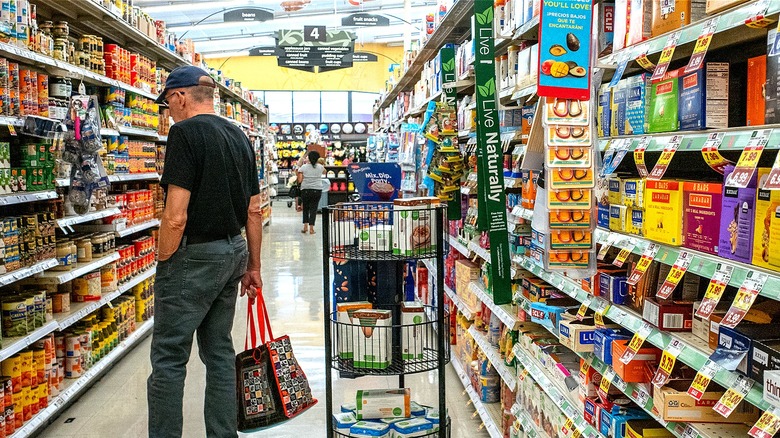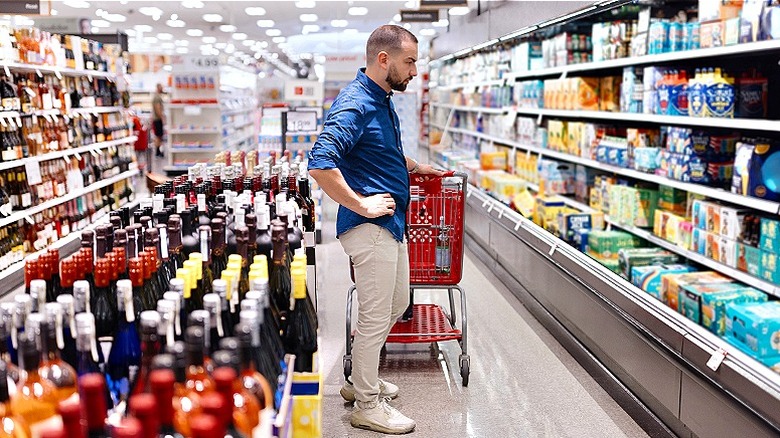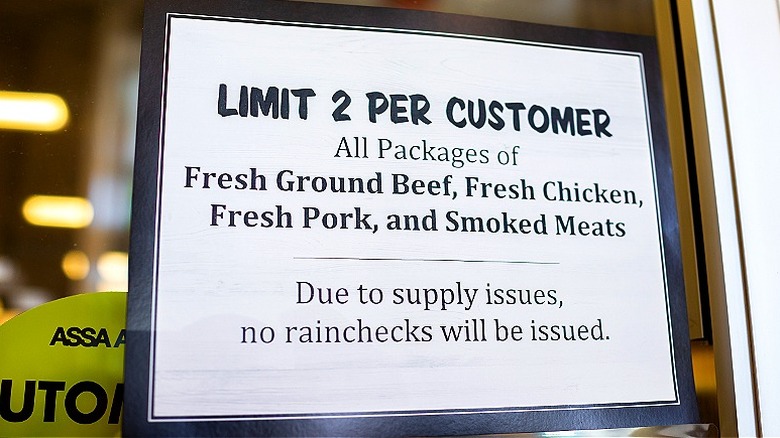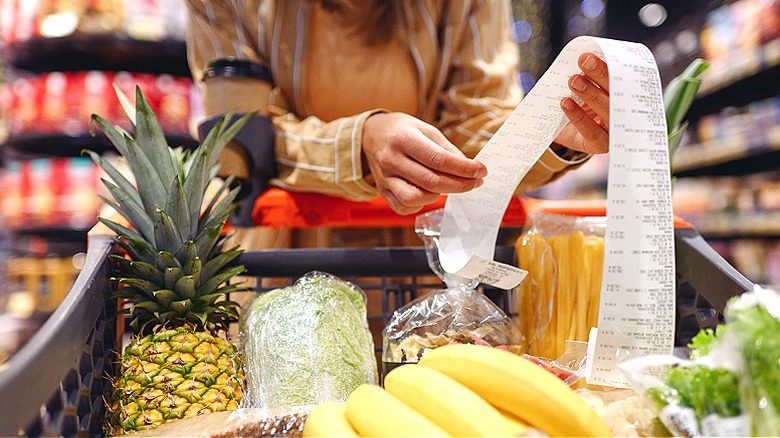The Money-Saving Grocery Store Hack Most Customers Aren't Even Aware Of
Shoppers have lots of tools at their disposal when seeking quality deals. For example, generic brands offer the same product at increased value in many instances, and buying in bulk will typically give you a better cost per item (a shopping strategy that Mark Cuban advocates using). These are just some of the benefits shoppers can find when bargain hunting. For other shoppers, they consistently make purchases with a rewards or cash-back credit card, and then promptly pay off the balance. This allows them to gain a small cash-back trickle or accrue travel or other rewards points on the purchases they'd already be making.
There's one hack, though, that grocery store shoppers can utilize to their advantage that often flies under the radar: rain checks. Using rain checks helps you get the most out of your weekly shop or special purchase, turning fortunes just a bit more in your favor. While the tool won't work as a blanket approach to all buying opportunities, it's applicable in enough areas of the shopping experience that consumers should acquaint themselves with the FTC guidelines on the matter and explore how their local retailers deal with the situation. Implementing rain checks in your own consumer retail habits can make for an improved experience overall and plenty of savings.
How grocery store rain checks work
The Federal Trade Commission regulates a key feature of retail food stores' behavior when it comes to sale pricing and discount offers. In the past, companies have sometimes (potentially, often) advertised price cuts and then intentionally failed to stock enough of the items in question to allow shoppers to actually benefit from the discounted offer. This tactic should be filed under the category of sneaky tricks used by grocery stores to entice consumers to spend more. It works to bring more customers into the store, priming them for spending without delivering on the promise of the specific purchase they came for.
A rain check solves this issue. An FTC rule decrees that when a grocery store advertises a discounted price, it must ensure that there's enough stock to meet "reasonably anticipated demand," and issue rain checks for advertised products if they run out of stock, among a few other technical details. Essentially, this means that even if a store doesn't have any more inventory of its sale item, you can get a written promise that allows you to come back and buy the item at that price later on — when the retailer does have it on the shelves again.
The rain check is a time-honored tradition, dating back to baseball's earliest days (giving fans a free ticket to a later game if their date gets rained out). Yet so many people today fail to capitalize on a grocery store's obligation to uphold its advertised promise if the shelves are emptied.
Store limits on rain checks
A rain check is a great option that can help you save money while grocery shopping or purchasing other goods. Shopping the sales is a common way to reduce your budget and create a bit of extra space for your finances, and shopping around and waiting for sales to take place allows you to get the same products for lower total cost (a big win for consumers). With financial struggles hitting homes across the country (even with historically strong prevailing economic conditions at play), any dollar saved is one that can be put to good use elsewhere in a household's budget. Rain checks help protect consumers against predatory pricing and bait-and-switch tactics by stores just looking to boost their revenue without giving consumers any real benefit.
With that said, not all goods are covered by rain-check language and policy. More importantly, not every store will include rain checks as a part of its offerings for customers. Walmart, for example, doesn't offer rain checks on sale items, even though it complies with the Unavailability Rule set out by the FTC. Walgreens offers rain checks on in-store items, but not online purchases, while other stores provide rain checks through their own (sometimes convoluted) terms. Publix, for instance, provides rain checks for goods advertised in mediums outside the store at discounted prices, like TV or radio ads. Target offers rain checks, but not on items listed with price cuts, clearance tags, and many other routine markings throughout the store.
Best practices for using rain checks
First of all, the only rain checks that should factor into your grocery shopping strategy should be those that actually provide value to your household and budget. There's no point in buying an item just because it's on sale. But products you frequently use, or something you've had your eye on that's suddenly discounted, can make for a great option.
If your selected good isn't on the shelf, the first port of call should be an employee who works in that area of the store. They can check alternative stock areas or explore the back shelves to find additional product reserves. Not every unit is placed on shelves at any given time, so there's a good chance you'll still be able to get whatever you're hoping for simply by asking for a bit of help.
If the item is unavailable, you'll want to ask the cashier for a rain check. They might send you to the customer service area, or write up a rain check ticket for you at the register. Either way, making it known that you're looking for this promissory note and plan to come back for the item later should be an early part of the interaction. This sets your expectations and needs out clearly and gives the store employee everything they need to serve you.
You'll want to mark down expiration dates for the rain check on your calendar and make sure you return to the store before then. If the item still isn't in stock, ask for another rain check to push out the expiration date further.



